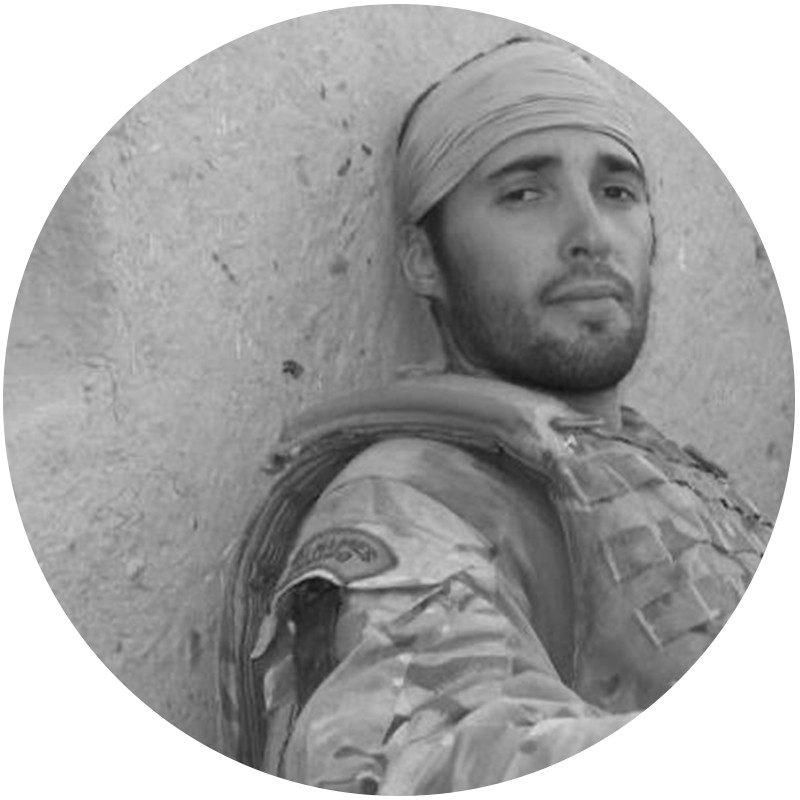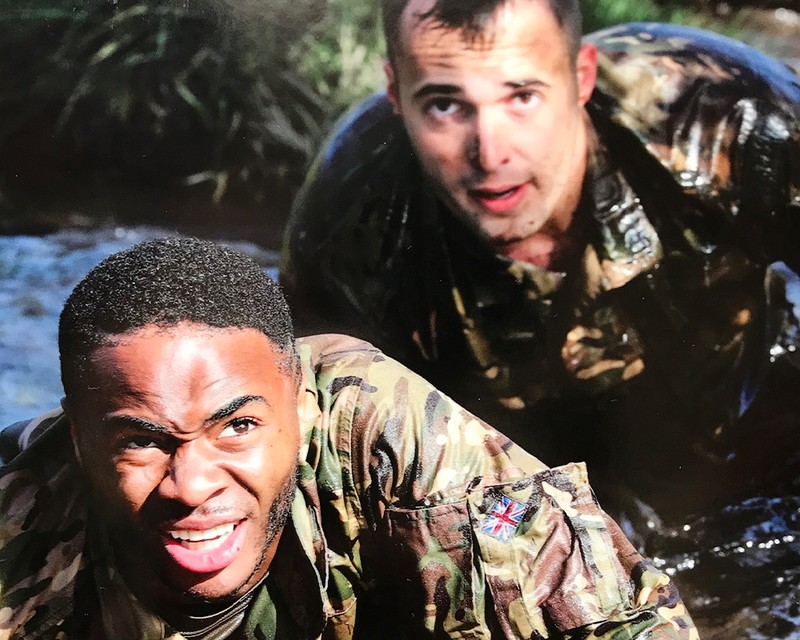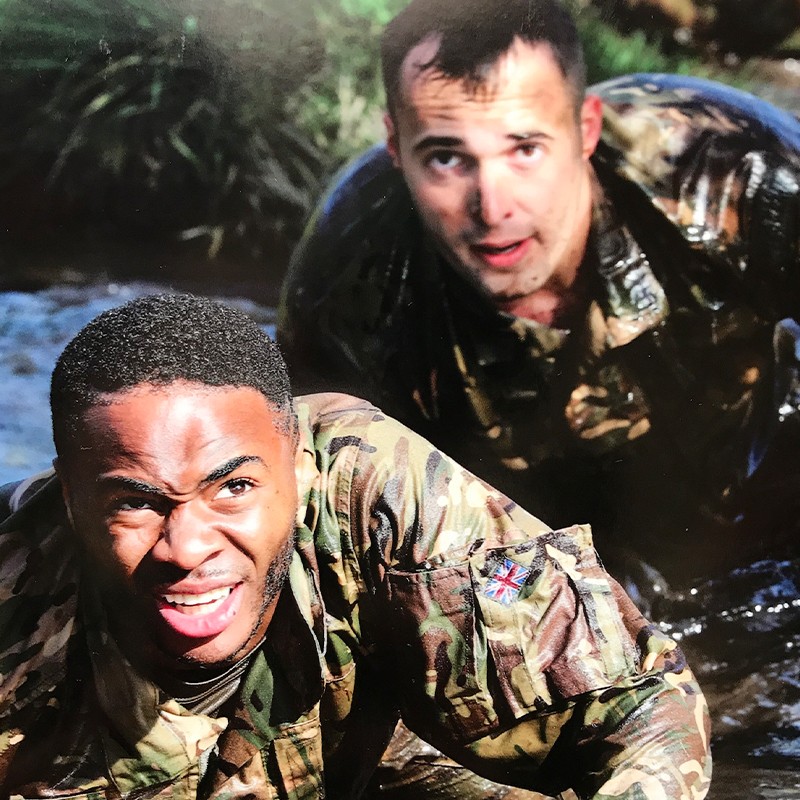Success Story: Ben Williams

As I progressed through my teens, my choices and habits got worse and worse. My parents had divorced when I was quite young and it was quite a sharp break. My mum did a lot of work for us, but her boyfriend wasn’t the father figure my brother and I needed. I moved around a few schools and I realise now I had an issue of not really liking men. I was angry and bitter, and in order to fit in with the cool kids I started smoking weed. The drugs took a bit more of a grip than I expected and things spiralled from there.
At 17 I was working as a bouncer outside a small nightclub in Bedford. I’d already wanted to join the Marines because my dad used to take us to the Royal Marines Museum in Portsmouth back when I was nine or ten, but my mum said I should finish my education and we fell out over that. I was a very scrawny 17-year-old so becoming a hard guy was another way to fit in. I got my bouncer’s licence and found that confiscating cocaine from people was an easy way to supply a habit. I’d also started using steroids. Things ended in tears outside the club one night and I was left unemployed.
One Tuesday I went for a drive because I just didn’t want to be here any more. I’d been cleaning toilets at a school to fund a bad cocaine issue, and really thought I’d do something ridiculous like drive into a lake or off a bridge. But a few hours passed and I hadn’t done it. When I got back home, I was very low and flicking through YouTube. Just by chance this old video of a Marines advert came on. There was a young lad looking a lot healthier and more determined than me in it.
It took six months to get clean and healthy for the medical. I’ve still got the date on my wall here: 15th May – that’s when I passed the three-day test you need to get through just to get into training. Training was a rollercoaster. In the first fortnight, an old friend of mine was killed in a car accident. That was very difficult, but they let me leave to go to the funeral and I think that put me on this mission to pass the course no matter what. Four weeks before the end, I got injured. With the rehab, that set me back an extra four months in training. As I finished the final 30-mile exercise, got my green beret and my family was clapping me off the parade square, I realised I’d come a long way.
When I joined the Marines in 2009, Afghanistan and Iraq were at their height. Nothing, not even training, prepares you for going into the ‘sandpit’. I had some defining moments out there that set me on the quest to understand myself and help others understand themselves better. In April 2011, on the day I had my first interaction with the enemy shooting at us, I was providing ‘overwatch’, which means lying on a roof with my machine gun, guarding a compound we’d occupied while my group got its breath back. There was someone hiding in some bushes, staring at me. They were dressed fully in black, just like the enemy we’d engaged with, and kept popping their head round a wall. I called for some cover and got a 5ft bit of wood thrown up to me. We pushed out a four-man team to investigate. As I shouted to the guys that he was still watching, the wood started to splinter and the rounds came in over my head, with that horrible crack and whizz sound. We had a battle from about 150m away and eventually he went quiet.
That evening I was back at our little camp. I was lying in a cot bed, outside because the tent was occupied, and it was the clearest of nights. We’d been hit again that day in a big enemy contact as we were getting onto the helicopters. It was still early in the tour but, staring up at the sky, I knew I needed to make it home and do something more with my life. It ended up being quite a nasty tour: I got blown up and came back four weeks early, which once again reminded me of my mortality and set me on the trail to understand myself better.

Unless you’re a Marine, you will never have the full ‘commando mindset’. But it can still help you a lot. The Marines give you a set of values that can help you in training, on the frontline or with life in general. Values are what we need to drive us, to help us find a purpose and to achieve our goals. They underpin the commando mindset, which is a way of thinking for when you’re facing a difficulty, when everyone’s back is turned or when there’s a global pandemic turning your life upside down. What I wanted to do with my book was show everyone a Marine’s perspective and how you can apply it to things like setting up a business or being a better parent.
If you walk into a lot of businesses and ask them what their values are, you’ll get a lot of boring answers. Ask any Marine what their values are and they’ll say integrity, courage and determination. These are human words that can actually help propel you forward. They are words to live – and sometimes die – by. They are the words that get you to step off the back of a helicopter and go through the doorway into an enemy compound.
If I told you what the England football team’s values are, I’d be giving away Gareth Southgate’s secrets. My business partner Ant and I met up with Gareth, Harry Kane, Raheem Sterling, the kitman – everyone involved, basically – just before the last World Cup. They had the ambition of bringing everyone a bit closer together. We did some Marine training with them and they all got wet, cold, muddy, tired, exhausted. We showed them what our values were and that helped them understand what theirs were. We’ve worked with a few sports clubs, from Cheltenham Town to London Wasps, and it’s always about asking people as individuals to leave their egos at the gate, so that when they go into that club, they live its core values.
It’s the same for businesses. We’ve done similar courses with big banks and one of the social media giants. As an organisation, if you understand your people and you’ve got the right values for them, they’re going to stick around and work twice as hard for you. We’ve seen it so many times. I remember one girl was really struggling with engagement at work, but we spoke to her about what she liked outside work and she was into rock climbing and mountain biking. Her value was ‘adventure’, the organisation bought into that and she really bought into them.
If an individual wants a commando mindset, they can start by asking themself a question. What do you truly want from life? If you can attach that inspiration to your personal values, you’re going to have a lot more courage and self-belief when it comes to confronting the fears that will inevitably come your way. No one likes to be outside their comfort zone, but I also believe not many people like to stay inside it all the time. The best place to be is right on the edge: dip into fear and you’ll learn about yourself; then you can step back inside, reset, and go again.
I’ve used the commando mindset to achieve the three things I feared most. I found the courage to leave home, leave my girlfriend of the time and leave my mum to become a Royal Marine. It was difficult and very uncomfortable to leave behind a particular lifestyle as well. Then I found the courage to have a child and take on that responsibility of looking after a family, and soon a second one came along. Going to war is one thing, but holding a child in your arms and having to protect it can be scary too. The third thing is starting my own business.
I’ve done the coaching thing; now we’re launching a tech business. Eighteen months ago, Ant wanted to start something in tech. I didn’t want to do it at the time because I didn’t understand tech and we were having a great time doing what we were doing. Nevertheless we came up with a few ideas I was quite invested in, but I was scared to take the leap. Then the pandemic came along and took away all of our coaching work. We used the time to create Loopin, which is simply about helping people and teams check in every day to see how they’re feeling. There was a lot of risk launching in the middle of a pandemic – we had to go out and find investment twice after the first one fell through. Taking on that risk meant facing some fears, but now I’m using what I learnt in the Marines to help organisations become even better places to work.
The commando mindset isn’t just another self-help tool. My story is real. These are experiences I’ve lived and tips I’ve picked up along the way. I was in a very dark place once and I found a way out of it. The same’s true for a lot of Marines – Ant had a gambling problem before he joined up. The commando mindset helped him find a way out too. I wrote the book for myself, but I know it can help other people.
Ben’s book, Commando Mindset, is available here. For more about his latest business, head to LetsLoopin.com.
DISCLAIMER: We endeavour to always credit the correct original source of every image we use. If you think a credit may be incorrect, please contact us at [email protected].


